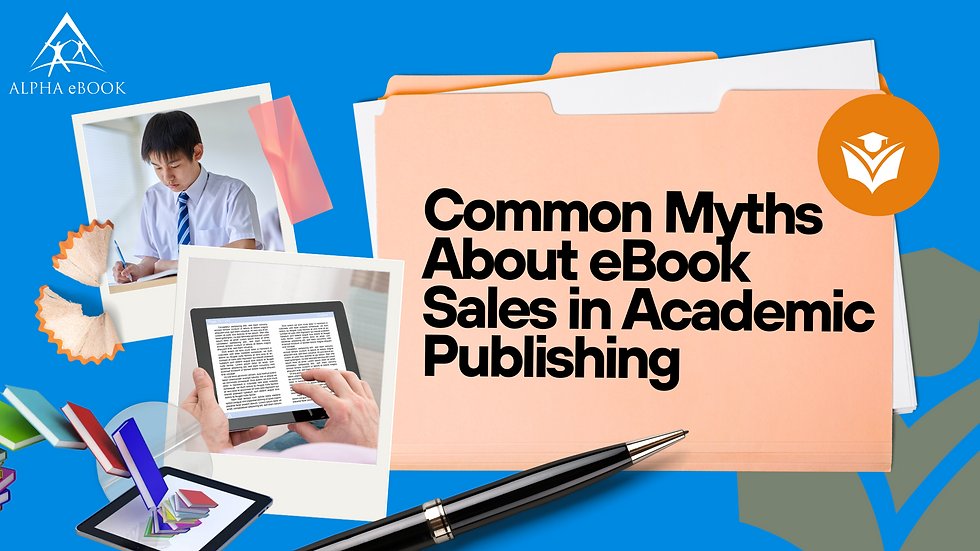The Top 3 eBook Formats Every Author And Publisher Should Have
- Alpha eBook

- Aug 24, 2022
- 4 min read

Ebooks have taken the publishing world by storm. In the past decade, ebook sales have grown exponentially and now make up a significant portion of the book market.
While print books are still popular, there is no doubt that ebooks are here to stay. As an author or publisher, it's important to be aware of the different ebook formats and to have your books available in as many formats as possible.
The three most popular ebook formats are EPUB, MOBI, and PDF. And eBook conversion companies like Alpha eBook can convert your book into all three formats.
This post will look at each format and discuss why they are important for authors and publishers.
About Ebook Formats
EBooks are the digital version of a print book and can be read on electronic devices like e-readers, smartphones, tablets, and computers. The writing process for an ebook is the same as for a print book, but there are some significant differences to keep in mind regarding formatting and design.
But, eBook formatting is not as simple as just uploading a Word document. Depending on the file format, there are different rules and guidelines for how the text should be formatted. A single ebook format limits an author or publisher to a single style, but it's easy to circulate an ebook in multiple formats. This way, the book can be enjoyed by readers on any device.
Here comes the author's part; it is their responsibility to ensure the book is formatted correctly so it can be read without any errors on the various devices. If you're unfamiliar with ebook formatting, it's best to hire a professional eBook conversion company to do it for you. They will take your Word document and format it according to the specific requirements of each file type.
The top 3 eBook formats for authors and publishers are:
EPUB
MOBI
PDF
ePub Format
The epub format is the most common electronic publication book style and a worldwide standard for eBooks. It is based on diverse technologies and standards, including Open eBook and XHTML 1.1. It's innovative since it incorporates the usual to provide a strong formatting foundation while providing eBooks in various forms and sizes. The ePub display engine does not yet support formatting standards, but the available format choices have outperformed all other formats.
Devices that Support ePub Format:
Ebooks in the epub format can be opened on a Windows or Mac computer with Adobe Digital Editions software.
For mobile devices, the most popular e-readers that support this file type are the Barnes & Noble Nook, Sony Reader, and Kobo Reader.
Apple devices like the iPhone, iPod Touch, and iPad also support epub books but require iBooks, a free app from the App Store.
Software like FB reader may open epub books on Linux computers.
MOBI Format
The MOBI format is one of the most well-known formats, and it's specially made for mobile and e-reader devices. The MOBI file format supports bookmarks, and the files are quite small. In addition, a file may be copyrighted or contain digital rights management (DRM) to protect against copying and illegal viewing.
The MOBI file format is based on HTML 3.2. It has some specific formatting constraints that distinguish it from other, more established formats like PDF. In the last few years, there has been no progress on the display engine or HTML support. However, with the kindle, it is becoming increasingly popular.
Devices that Support MOBI Format:
Amazon's Kindle and the MobiPocket Reader are the primary devices that read MOBI files. These can be used on mobile phones, PCs, Macs, and desktop computers.
These files can be viewed on a desktop with or without specified software installed.
PDF Format
The PDF is a popular format that's readable on almost any device. PDF documents look the same regardless of the device or operating system they're viewed on. Also, they can contain bookmarks, links, and other features to make them more interactive. Other software programs are available to install on your computer, including a printer, allowing you to print PDFs from almost any program.
The most significant disadvantage of PDFs is that they do not support text reflow. When viewing PDFs on a small screen, the screen should be zoomed in to make the material legible. Instead, the user must scroll from left to right or vice versa to read all text in one line, which is often inconvenient.
Another disadvantage of the PDF format is that major retailers do not sell it, making it hard to distribute. However, you may list them on your website for direct purchase or sell them on a smaller site specializing in PDFs.
Devices that Support PDF Format:
This content is viewable on computers using Adobe Acrobat Reader and Foxit Reader.
Adobe Digital Editions also works with PDF on Windows and Mac computers.
PDF files are also supported by Amazon's Kindle Dx and Sony's products.
In Conclusion
The EPUB, MOBI, and PDF are the top 3 eBook formats that every author and publisher should have. Each format has advantages and disadvantages, so choose the best one for your needs. The professional eBook conversion service will help you convert your eBook to any of these formats. They will help with the file type best suited for your book and your target audience.




Comments